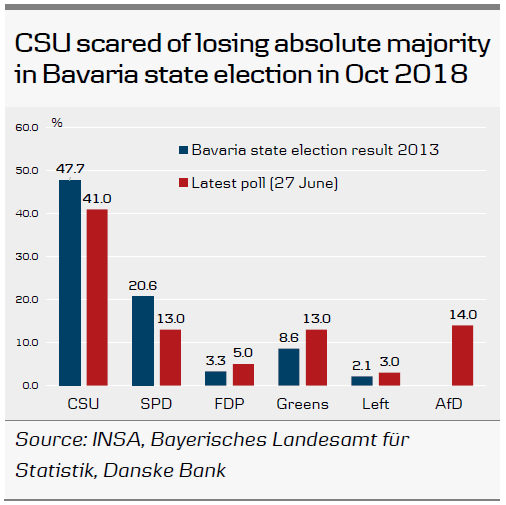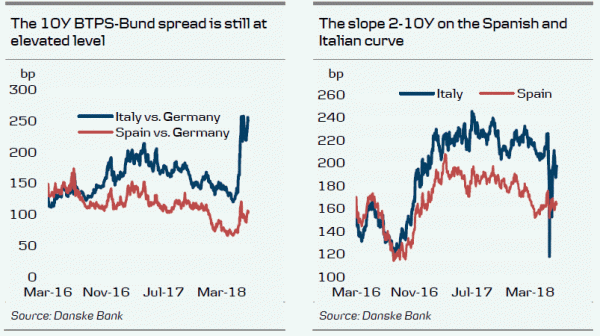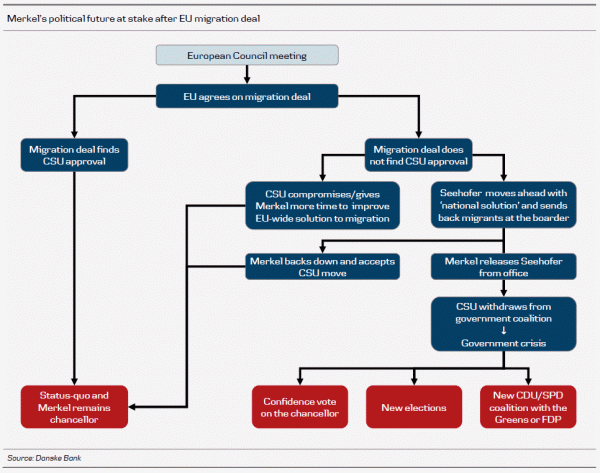EU summit: main results so far
Migration
- Establishment of ‘controlled centres’ across the bloc for processing migrants.
- Increased development funding for Africa.
- Curb secondary movements of asylum seekers.
- Reform of EU asylum rules.
Defence
- Strengthen European defence through enhancing investment, capability development and operational readiness.
Trade
- Need to preserve and deepen rules-based multilateral system.
As the European Council meeting draws into its second day, where notably eurozone reforms and Brexit are on the agenda, EU leaders struck a hard-fought deal yesterday on migration already. Apart from strengthening the EU’s external borders, they also agreed in a 12-point plan – in a concession to Italy – to establish regional disembarkation platforms for people saved at sea. Migrants should be shared across the EU territory on a voluntary basis and transferred to ‘controlled centres’ across the bloc for rapid and secure processing of asylum claims. A distinction would be made between irregular/economic migrants earmarked for return and those in need of international protection, for whom the principle of solidarity would apply.
Although the deal is a first step in the right direction and even Italy’s Prime Minister Giuseppe Conte signalled satisfaction with it, open questions abound: how many countries would actually be willing to establish these ‘controlled centres’ on a voluntary basis? Where would successful and failed asylum claimants be sent afterwards? How will the reform of the Dublin Regulation and establishment of a new Common European Asylum System be spelled out? Austria – which has an anti-immigrant government already – will take over the presidency of the EU Council from 1 July. Focus on asylum and migration issues and protection of external borders will remain a hot topic in the meantime.
A viable European solution to migration was particularly important for German chancellor Angela Merkel, who is approaching a weekend ultimatum set by her CSU coalition partner. The agreement includes only a small paragraph on the issue of secondary movements of asylum seekers, calling on members to take all necessary ‘internal legislative and administrative measures’ to counter movements of asylum seekers across borders.
The key question is whether this vague formulation will be enough for the CSU to relinquish its plan of sending back already-registered asylum seekers at the German border, triggering repercussions for other EU countries such as Austria and Italy. If it does not satisfy the CSU, Interior Minister Horst Seehofer has the power to move ahead unilaterally with his plan of turning away migrants at the border. This would put Merkel in a tight position, where she might feel pressured to relieve Seehofer of his duties for his open defiance. In this case, it is difficult to imagine the CSU remaining part of the German governing coalition. This would leave the CDU/SPD coalition two seats short of a majority in parliament.
A breakdown of the German government is clearly not in the CSU’s interest, but it has also manoeuvred itself into a tight corner. Budging from its flagship migration policy would cost it dearly in the upcoming Bavarian state election in October, where the anti-immigrant AfD party is its biggest rival. The CSU is on track to suffer a significant decline in the vote in October, compared with the 47.7% it won in the last state election five years ago, and it may lose its absolute majority of seats. That said, the CSU’s ultimatum approach is not without risks: according to an Infratest Dimap poll, 75% of Germans favour a European solution to migration, compared to 22% for a national one. Should the CSU steer Germany into a political crisis, it could also result in a strong voter backlash in the state election.
The next key date to look out for is Sunday 1 July, when CDU/CSU party officials will meet again to discuss immigration, and Seehofer is expected to announce his verdict on Merkel’s migration deal. So far, a de-escalation and eventual resolution of the German government crisis remains our base case, as all involved parties have an interest in some kind of compromise solution. That said, we should not underestimate the risk of the German government breaking apart and the toppling of Merkel over the coming months (see scenarios below). Should she be replaced by a more hard-line/conservative candidate, this could also have grave repercussions for the stability and resilience of the EU and bring the European political risk premium back into markets.
Impact fixed income markets
As the EU continues the ‘kicking the can down the road’ approach with the recent migration deal, it is supportive for the peripheral markets relative to the core EU (Germany).
The migration ‘deal’ made by the EU is positive for peripheral markets, as it has shown that the EU can find a compromise even though there are several unknown factors in the deal. If Seehofer supports the deal (as in our base case), there is room for more performance in Italy (and Spain and Portugal) across the curve. We typically see a steepener of the Italian curve in this environment between 2Y and 10Y.
If the CSU and Seehofer choose not to support the deal and Germany is thrown into a political crisis, Italy will underperform and the curve will flatten. This is not our base case.
As noted above, we expect the CSU to support the deal and for Merkel to remain as Chancellor of Germany. However, we are still reluctant to buy Italy even though spreads are still at elevated levels. We have some hard budget negotiations coming up in Italy and there is plenty of issuance from the Italian Debt Office, so there is no need to rush in and buy Italian government bonds.



